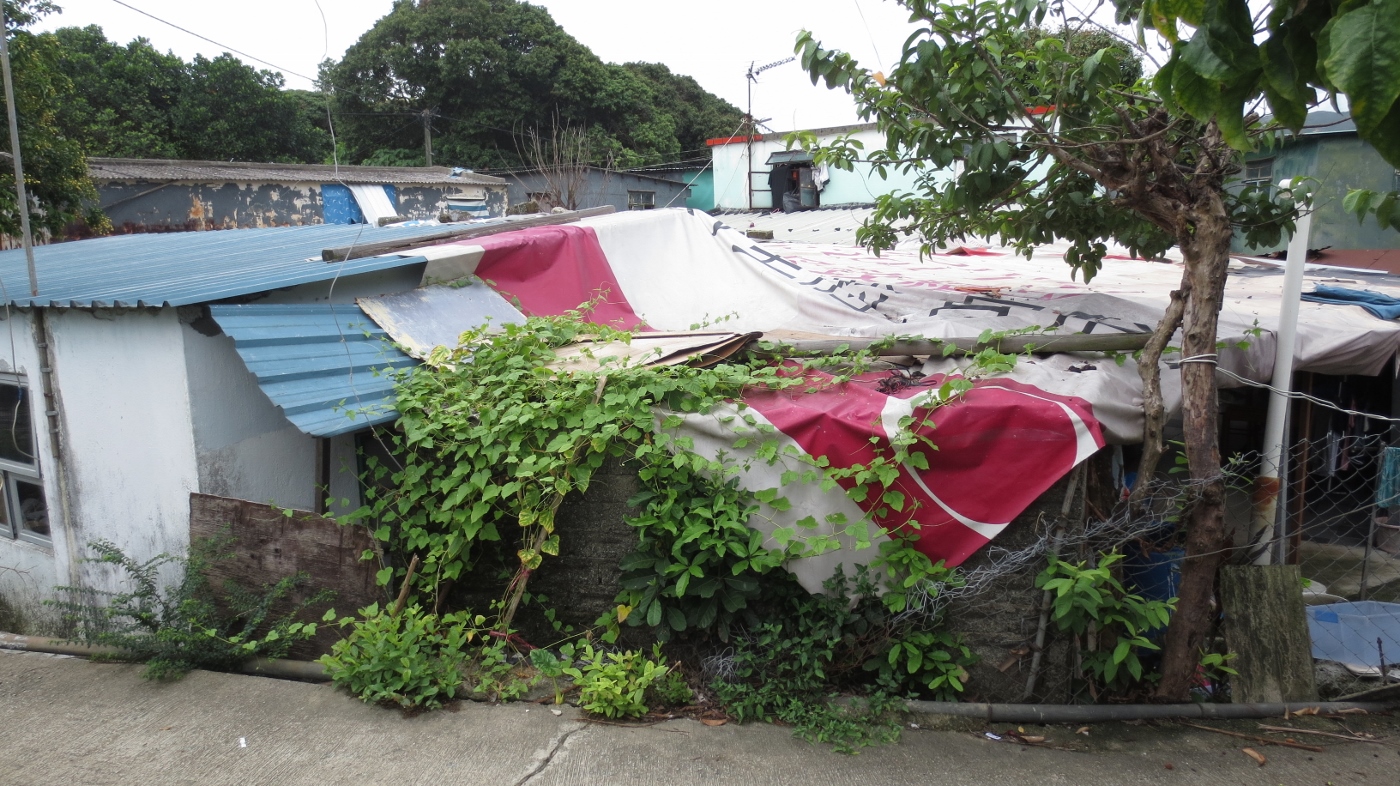
In the New Territories, close to the MTR Light Rail station of Nai Wai, the stench of excrement emanating from a pit toilet in a crowded refugee slum we recently visited was overwhelming. A seasoned reported we accompanied was shocked by the dreadful conditions and gagged at the offensive odor. With extensive experience in India, he noted, “600 million Indians defecate in the open, but this is Hong Kong, an international financial centre, and these shelters are approved by a government contractor and rent is paid with public money, right?”
At times, the torrential rain splashed through the ventilation gaps in an unsound roof hazardously weighed down by discarded material, including several rotting mattresses. A spokesman for the 15 refugees settled in the abandoned pigsty lamented the atrocious conditions, “Where else can we live? 1500$ (in rent assistance) is not enough. My bed is wet from the rain. Last night I slept on a chair with an umbrella. We don’t have toilet … there is a dirty hole in the ground … How people say we come to Hong Kong for a better life?”
The safety, hygiene and sewerage in this slum are manifestly horrendous and a shock to the conscience of any observant visitor. Since Vision First exposed this slum in December 2013, it featured in dozens of media reports, both local and international, but the authorities have failed to close it down and relocate endangered refugees to basic, safe and clean housing.
Vision First queries whether this dump complies with the SWD Invitation to Tender that requires, “The Contractor shall ensure that Service Users … are provided with accommodation, identified … in the private sector (including electricity, water, gas supply and other basic utilities). The Contractor shall … monitor the living condition … conducting spot checks and home visits … to ensure the safety and hygiene condition of the accommodation … and shall handle emergency relocation …”
Several of the 69 refugee slums exposed by Vision First were closed in 2015. In those cases – for reasons that haven’t been made public – caseworkers informed the affected refugees that rent payments would cease from one month to another, thus abruptly terminating questionable arrangements that had previously thrived unchallenged for years. However, interestingly enough, it was not always the worst slums that closed down first. Rather, acceptable or unacceptable documentation might determine the closure or approval of refugee slums.
What leads a supposedly civilized society to abandon human beings in extreme degradation? Academics explain the marginalization and precarization of troublesome and unwanted communities. Scholars articulate the stigmatization and criminalization by the state and other dominant forces of undeserving social rejects for containment and control purposes. A USM appeal judge (name withheld) went as far as harangued a powerless refugee, “Asylum seekers are a problem for Hong Kong. Why you come here? What do you expect, a five star treatment?”
The honourable judge might agree that defecating in open sewers should not comply with acceptable standards. The refugee slums are an affront to the decency of every citizens of Hong Kong. These compounds are the shameful legacy of a failed ‘humanitarian assistance’ that a slum-dwelling refugee rightly described as “treating us like animals.”
Refugees are not unaided indigent persons compelled to find shelter wherever practical. Caseworkers visit their hovels. Housing managers approve their tenancy agreements. Hundreds of millions of dollars are channeled to landlords. Media reports expose housing failures. Lawmakers complain to Legislative Council panels. But regrettably the mockery of human dignity persists unabated.
Do these appalling living conditions and distressing human suffering evince an apparent limit to Vision First’s advocacy against refugee slums subvented by the Social Welfare Department? If so, should other sections of society also step in? It might be argued that anyone who has direct or indirect knowledge of this problem shoulders a fraction of the blame for its continuation.
Ultimately, beyond the recrimination, responsibility and social-legal implication are the men, women and children who suffer deplorable living conditions in the shadow of expensive rural villas. Nowhere else in Hong Kong does the rich-poor divide make a starker contrast! Some witnesses find it hard to sleep at night knowing that fellow human beings are crushed by extreme destitution and society is not doing anything about it.

























